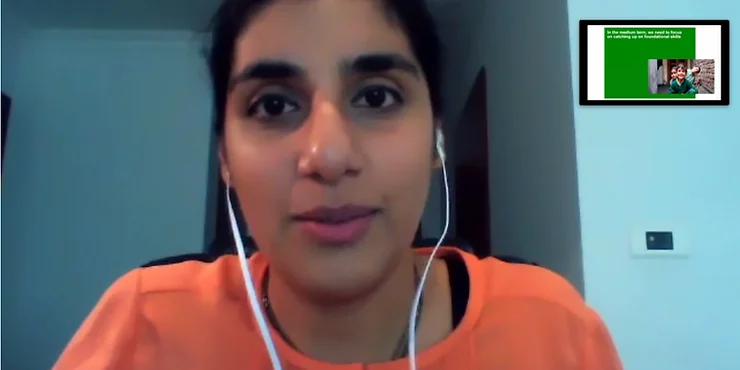According to the UNESCO Institute for Statistics, more than 258 million students are still out of school across the world. These numbers were released before the global pandemic struck multiple countries. Today, the unfortunate realities of the COVID-19 affected world have increased the amount drastically. With schools and educational institutions having to close down abruptly, millions of children are confined to their homes in education systems, not equipped to deal with such circumstances.
“This pandemic has brought to light the lack of resilience in our education systems,” shared Ms. Jahnvi M Kanoria, Director, Innovation Development, Education for All. As part of a webinar series hosted by Bangalore based NGO Mantra4Change, Ms. Jahnvi highlighted the need to reinvent learning as we know it, to prepare our education systems to handle new realities like a pandemic. “We have never imagined school without the physical space and a teacher as its core offering,” she shared while dwelling on the need to find new alternatives like online schooling. She believes these alternatives will better prepare us not only to face harsh realities like a lockdown but also to address other failures of the system. These alternatives can help support existing systems and enable over 130 million children who, despite going to school, are unable to read and write at their grade levels.
In the wake of #stayathome instructions introduced in many countries, schools switched online with teachers hosting classes on platforms like Zoom and students spending six hours in front of an electronic screen. However, another glaring reality is that more than 70% of the 1.5 billion children in schools have access to internet connections and resources like computers and smartphones. These learners also belong to the most vulnerable sections of society, which present a different set of challenges.
“We need to try new things now and figure out what is working and what is not” shares Ms. Jahnvi as she explores some ways to tackle these challenges in ensuring learning continues even for 70 % of children from vulnerable communities. Organizations like Education for All are compiling together innovative practices from across the world to help circulate ideas. Practices like the one adopted by a Pakistan based organization that is using local radio channels to engage students through storytelling. They are even curating interactive sessions through speaking activities and riddles to enhance the learner’s participation.
Multiple institutions and organizations have also been leveraging platforms like Whatsapp, using it to share learning resources and address concerns and questions from students. It is only possible for those who have access, of course, and for those who do not, local organizations in Kenya are converting school buses into portable internet hotspots. The vehicles are going into communities and providing windows of connectivity each day. Even in places where technology is scarce, organizations are creating physical work packs for students in remote regions and delivering them while following social distancing norms. These are some of the examples shared by Ms. Jahnvi while she urged others to share their ideas of reinventing learning in this new reality.
While ensuring students have access to resources and teachers, another essential factor to consider is the ‘How are we designing the content?’ The nature of learning materials must encourage student autonomy and focus on low dependency on technology, resources, and support, especially materials designed for children from vulnerable communities. We must curate ‘Project Banks’ for different age groups with simple learning resources that may need little or no support from parents, or require children to use simple tools available at home. Ms. Jahnvi’s organization Education For All has created such a pool of activities available on their website, which suggests multiple activities. Activities like ‘The Pop-Up restaurant’ where young learners are expected to create menus and meals, focusing on literacy while working on recipes or maths while pricing the items of the list. These creative project banks reinvent learning in a unique yet simple manner, which is increasingly becoming the need of the hour.
Another crucial aspect to focus on while discussing learning in vulnerable communities during this time is the role of the families. Many children in such environments are first-generation learners, so, literacy of parents and other adults around them is a concern, moreover, due to the economic difficulties of the times, many parents are unable to support their children’s learning. It has highlighted the need to define the roles of parents/guardians in contributing to the child’s education. The pandemic has highlighted the need to rethink how we can involve parents in the learning journey as partners for their children with teachers supporting in subject-specific learning.
The unprecedented reality of the world today is pushing us to reinvent our perspectives on not only how we function as economies and countries but also how learning is perceived and executed in the world. We, at Mantra4Change, alongside our partners, have taken up this new challenge and will continue to innovate towards ensuring enriching learning experiences to the most vulnerable communities in India.


